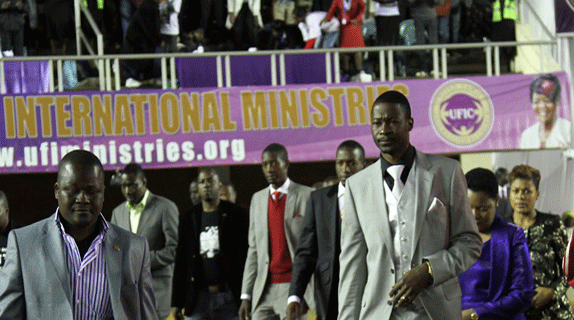
WHAT is a church? The word church first appears in the New Testament and comes from the Greek term ekklesia which is formed from two Greek words meaning “an assembly” and “to call out” or “called out ones”.
RICHARD MUPONDE SENIOR REPORTER
The New Testament church is a body of believers who have been called out from the world by God to live as his people under the authority of Jesus Christ (Ephesians 1:22-23).
This group of believers or “the body of Christ” began in the book of Acts chapter two on the Day of Pentecost through the work of the Holy Spirit and would continue to be formed until the day of the rapture of the church.
A person becomes “a member” of the church simply by exercising faith in Jesus Christ as Lord and Saviour. In Zimbabwe, churches have existed since the colonial era with Christianity being introduced by missionaries.
The leading churches that dominated the Christian landscape had always been the Roman Catholic, Anglican, Methodist, Seventh Day Adventist, Brethren In Christ and the Lutheran churches.
Pentecostal churches established by indigenous persons such as the Zimbabwe Assemblies of God Africa Foward in Faith International, Family of God, Word of Life, Assemblies of God and others started mushrooming.
However, the economic meltdown triggered the influx of more spiritual churches concentrating mainly on the gospel of prosperity and miracles.
- Chamisa under fire over US$120K donation
- Mavhunga puts DeMbare into Chibuku quarterfinals
- Pension funds bet on Cabora Bassa oilfields
- Councils defy govt fire tender directive
Keep Reading
Because of the ensuing poverty, joblessness and general hardships, most citizens turned to these churches for salvation as they promised their followers prosperity and deliverance from diseases if one became a member of the churches.
Interestingly, most of these churches belonged to individuals and were formed by husbands and their wives who bestowed on themselves the titles of prophet and prophetess. They thrived on claims of performing an avalanche of miracles ranging from miracle money, miracle babies and miracle recharge of airtime and pre-paid electricity.
Many unsuspecting and desperate people are being exploited by some of these churches to part with their hard earned cash into believing they will receive blessings. Most of these miracle churches are based in urban areas and operate mainly from the central business district.
The owners of these churches, who call themselves prophets, live fairy-tale lifestyles with mansions in plush suburban neighbourhoods.
They are chauffeur-driven in the latest posh vehicles which move in convoys accompanied by hordes of bodyguards.
They also have a penchant for extremely expensive designer clothing, which some boast they acquire from the world’s fashion capitals in France and Italy.
While the majority of their followers wallow in abject poverty, these modern day celebrity prophets continue to live it up promising them that miracles would soon happen in their lives.
Some of these spiritual stars have even gone a step further and boasted about their riches to their congregates and in the media and urge their followers to continue giving money to the church so that they can be blessed. These preachers rank among the richest people in Zimbabwe at present when the economy continues to falter.
In Bulawayo, in particular, the mushrooming of these churches has resulted in them taking over most premises of closed companies turning them into centres of “worship”.
They rival any business venture and are seemingly driven by an appetite to make a quick buck by the leaders rather than spreading the word of God.
Conventional churches such as the Catholics and Anglicans were known for their conventions over the Easter holiday.
The Anglicans would make a pilgrimage to the Bernard Mizeki shrine in Marondera while other churches take time out to go for camps.
However, the new spiritual churches seem to have taken over the limelight holding miracle crusades that are hugely publicised.
By far the biggest and probably most talked about gathering this Easter is the Emmanuel Makandiwa-led United Family International’s “Judgment Night 2” themed crusade at the National Sports Stadium in Harare.
The church has promised that people’s lives would be changed and miracles happen in people’s lives, although very few have come forward to present evidence that these judgment nights have transformed their lives.
Zimbabwe Institute for Social Transformation executive director reverend Useni Sibanda said these churches should be given time before they can be judged by their fruits.
“We shouldn’t throw away water and the baby. In every community there are people doing things for the wrong reasons,” he said. “These churches should be given time so that we see which one is wheat and which one is chaff.
“Weeds which grow in a wheat field are very similar to the wheat that sometimes when you pluck them early, you could pluck out wheat instead.
“It’s good to wait for the fruits. We can only judge people by their fruits not by speculation or material wealth to see if they are men of integrity, honest and accountable to the community. That should be a measuring yardstick.”
Sibanda, however, defended the wealth of the church leaders saying there was nothing wrong with it as some of them could have earned them without churches as they were professionals.
“The problem is missionaries made us believe that a church leader or priest should be poor.
“However, we have since discovered that these missionaries were coming from rich families in their countries entitled to gratuities and pension.
“There is no problem with these church leaders getting rich since most of them are educated and doing business outside church. They could have managed to accumulate riches with or without the church.
However, what they do with the riches is important because it should be seen whether they are helping the poor, orphans, widows and other disadvantaged people. This also is done if the church has money,” Sibanda said.
The director of the Zimbabwe Christian Alliance, Josphat Amuli concurred with Sibanda that it was difficult to condemn the church leaders as wealth accumulators.
“It’s a very tricky area. We can’t out rightly say they are, but the bible said in the last days weed will grow together with wheat. However, we acknowledge that there are a lot of unscrupulous religious leaders and groupings that are sprouting,” Amuli said.
“If you use manipulation as a way of making people give money to the church, that’s being unscrupulous. People should willingly give to the church and the poor, but if they are coerced to do so, that will be questionable and unbiblical.
There are some churches which are spirit filled doing the right thing. This thing is like an examination where you use a syllabus to prepare for it but there are others who use the wrong books, but ours is the bible,” Amuli said.
The sprouting of these new churches preaching the gospel of prosperity has led to mainstream traditional churches slowly losing members desperate for financial and material prosperity.










